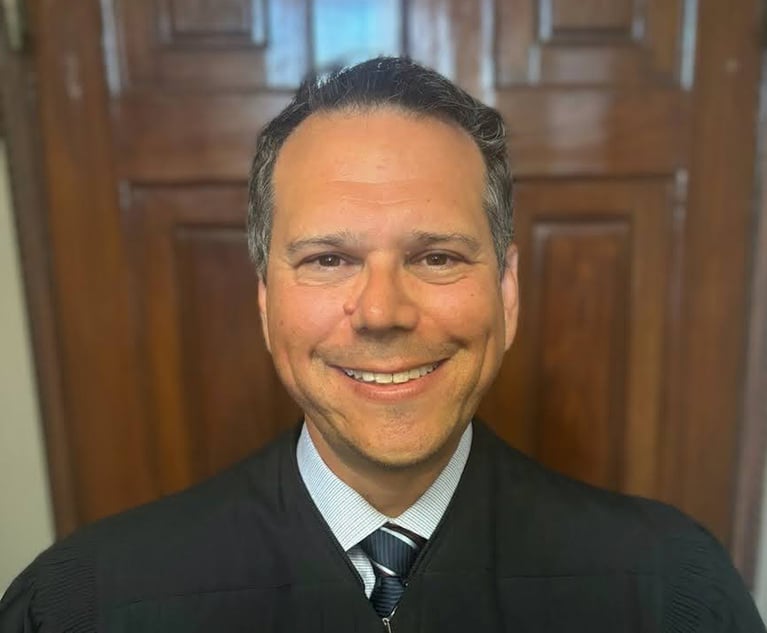Daily Dicta: Parking Scofflaws of the World, Rejoice
In a first-of-its-kind decision, the Sixth Circuit held that tire chalking violates the Fourth Amendment's ban on unreasonable searches.
April 23, 2019 at 12:41 PM
6 minute read
 Michigan lawyer Matthew Gronda was outside the courthouse in Saginaw, talking on the phone to fellow attorney Philip Ellison, when he saw a parking enforcement officer chalking the tire of his car—a way to track how long he'd been parked.
Michigan lawyer Matthew Gronda was outside the courthouse in Saginaw, talking on the phone to fellow attorney Philip Ellison, when he saw a parking enforcement officer chalking the tire of his car—a way to track how long he'd been parked.
“What right does she have to chalk my tire?” he fumed to Ellison.
What right, indeed?
None at all, according to the U.S. Court of Appeals for the Sixth Circuit, which on Monday sided with Ellison in a first-of-its-kind decision holding that tire chalking violates the Fourth Amendment's ban on unreasonable searches.
Parking scofflaws of the world, rejoice!
“Yes, we made a federal case out of chalking a tire,” said Ellison, a Hemlock-Michigan-based specialist in property and water rights who runs his own firm, Outside Legal Counsel.
(For the record—a parking officer will chalk mark a tire and then circle back a few hours later. If the car with the chalk mark is still there, that means it's exceeded the parking time limit.)
The two lawyers brainstormed a novel constitutional theory, arguing that the U.S. Supreme Court's 2012 decision in U.S. v Jones—where the high court held that police investigators were out of line in secretly placing a GPS device on a suspect's car without a warrant—also applies to tire chalking.
“The hue and cry of 'that's the way we've always done it' does not turn an unconstitutional activity into a constitutional one,” they wrote in 2017 in a complaint filed in U.S. District Court for the Eastern District of Michigan.
 “No law allows this local government or its parking enforcement officials to place anything—a mark or otherwise—on a private vehicle,” they continued. “Placing such on a private vehicle is the physical occupation of private property for the purpose of obtaining information, and is, under United States v Jones, an unconstitutional act when done without a warrant.”
“No law allows this local government or its parking enforcement officials to place anything—a mark or otherwise—on a private vehicle,” they continued. “Placing such on a private vehicle is the physical occupation of private property for the purpose of obtaining information, and is, under United States v Jones, an unconstitutional act when done without a warrant.”
The duo sued on behalf of a friend, Alison Taylor, who had gotten more than a dozen parking tickets as a result of her car's tires being chalked. (Ellison explained that Taylor works in downtown Saginaw, where parking options are few and spots have two-hour time limits. On the days Taylor couldn't repeatedly move her car, she racked up citations starting at $15 a pop.)
The lawyers took the case—a putative class action on behalf of everyone who got a parking ticket in Saginaw based on chalked tires—on contingency. Ellison figured it was worth a shot if only for the fun of “taking on the government and challenging the status quo.”
He and Gronda scoured court dockets nationwide for similar cases. As far as he can tell, Ellison said, they're the first to test the argument.
Besides, he added, “Who hires a lawyer and spends tens of thousands of dollars to challenge a $15 parking ticket?”
They struck out at the district court level. True, U.S. District Judge Thomas Ludington agreed with them that the chalk mark—although “harmless and temporary”—could constitute a trespass under the Jones decision.
But Ludington found that the search was reasonable under the “community caretaker” exception.
“Taylor cannot reasonably argue that the City of Saginaw does not have authority to enforce its parking regulations, and the practice of chalking is a reasonable exercise of that authority,” the judge wrote in dismissing the case. “Active enforcement of parking regulations benefits the public by ensuring convenient access to public parking. If the police have the authority to impound a vehicle while enforcing parking regulations, surely they have the authority to chalk a vehicle's tire while enforcing parking regulations.”
But Ellison said the judge missed the point. “We're not saying everyone is entitled to free parking,” he said. “We're just saying you can't do it that way anymore.” Parking structures, meters, permits or apps would all be perfectly legal alternatives, he added.
On appeal, the Sixth Circuit agreed. Writing for the unanimous panel, Judge Bernice Bouie Donald, who was appointed to the bench in 2011, held that the search was unreasonable. “Because we chalk this practice up to a regulatory exercise, rather than a community-caretaking function, we reverse.”
(Mild groan on the 'chalk' pun.)
Like the lower court, the panel held that chalking is indeed a “search” for Fourth Amendment purposes. Citing the Jones decision, Donald wrote that “a search occurs when the government: (1) trespasses upon a constitutionally protected area, (2) to obtain information. … As the district court properly found, this physical intrusion, regardless of how slight, constitutes common-law trespass.”
But Donald plus Judge Raymond Kethledge, a George W. Bush appointee, and Senior Judge Damon Keith (who will turn 97 in July!) parted ways with Ludington in assessing whether the search was reasonable.
They noted there was no probable cause to believe Taylor's car contained evidence of a crime, nor was it towed following an arrest—both instances where warrantless vehicle searches have been deemed permissible.
Instead, chalking tires means that “the city commences its search on vehicles that are parked legally, without probable cause or even so much as 'individualized suspicion of wrongdoing'—the touchstone of the reasonableness standard,” Donald wrote for the panel. “Thus, we reject the city's contention that searching Taylor's vehicle was reasonable based solely on its reduced expectation of privacy.”
The panel also rejected the community caretaker exception, which “does not provide the government with refuge from the warrant requirement except when delay is reasonably likely to result in injury or ongoing harm to the community at large.”
Here, Taylor's car was parked in a proper spot and created “no safety risk whatsoever. Because the purpose of chalking is to raise revenue, and not to mitigate public hazard, the city was not acting in its 'role as [a] community caretaker[.]'”
The panel concluded, “While the city is entitled to maintain efficient, orderly parking, the manner in which it chooses to do so is not without constitutional limitation.”
Ellison and Gronda may have been the first to try out this argument, but I can't imagine they'll be the last, especially if their class gets certified. They want the city to refund every parking ticket—and pay their attorney fees to boot.
This content has been archived. It is available through our partners, LexisNexis® and Bloomberg Law.
To view this content, please continue to their sites.
Not a Lexis Subscriber?
Subscribe Now
Not a Bloomberg Law Subscriber?
Subscribe Now
NOT FOR REPRINT
© 2025 ALM Global, LLC, All Rights Reserved. Request academic re-use from www.copyright.com. All other uses, submit a request to [email protected]. For more information visit Asset & Logo Licensing.
You Might Like
View All
Litigators of the Week: Simpson Thacher and ACLU Team To Challenge Louisiana's Ten Commandments Law

A Reporter and a Mayor: Behind the Scenes During the Eric Adams Indictment News Cycle

Even With New Business Courts, Texas Is a Long Way from Taking Delaware's Corporate Law Mantle
5 minute read
Trending Stories
- 1People in the News—Jan. 8, 2025—Stevens & Lee, Ogletree Deakins
- 2How I Made Partner: 'Avoid Getting Stuck in a Moment,' Says Federico Cuadra Del Carmen of Baker McKenzie
- 3Legal Departments Dinged for Acquiescing to Rate Hikes That 'Defy Gravity'
- 4Spalding Jurors Return $12M Verdict Against State Farm Insurance Client
- 5Special Series Part 3: The Statutory Guardrails Violate the Majority Vote Rule
Who Got The Work
Michael G. Bongiorno, Andrew Scott Dulberg and Elizabeth E. Driscoll from Wilmer Cutler Pickering Hale and Dorr have stepped in to represent Symbotic Inc., an A.I.-enabled technology platform that focuses on increasing supply chain efficiency, and other defendants in a pending shareholder derivative lawsuit. The case, filed Oct. 2 in Massachusetts District Court by the Brown Law Firm on behalf of Stephen Austen, accuses certain officers and directors of misleading investors in regard to Symbotic's potential for margin growth by failing to disclose that the company was not equipped to timely deploy its systems or manage expenses through project delays. The case, assigned to U.S. District Judge Nathaniel M. Gorton, is 1:24-cv-12522, Austen v. Cohen et al.
Who Got The Work
Edmund Polubinski and Marie Killmond of Davis Polk & Wardwell have entered appearances for data platform software development company MongoDB and other defendants in a pending shareholder derivative lawsuit. The action, filed Oct. 7 in New York Southern District Court by the Brown Law Firm, accuses the company's directors and/or officers of falsely expressing confidence in the company’s restructuring of its sales incentive plan and downplaying the severity of decreases in its upfront commitments. The case is 1:24-cv-07594, Roy v. Ittycheria et al.
Who Got The Work
Amy O. Bruchs and Kurt F. Ellison of Michael Best & Friedrich have entered appearances for Epic Systems Corp. in a pending employment discrimination lawsuit. The suit was filed Sept. 7 in Wisconsin Western District Court by Levine Eisberner LLC and Siri & Glimstad on behalf of a project manager who claims that he was wrongfully terminated after applying for a religious exemption to the defendant's COVID-19 vaccine mandate. The case, assigned to U.S. Magistrate Judge Anita Marie Boor, is 3:24-cv-00630, Secker, Nathan v. Epic Systems Corporation.
Who Got The Work
David X. Sullivan, Thomas J. Finn and Gregory A. Hall from McCarter & English have entered appearances for Sunrun Installation Services in a pending civil rights lawsuit. The complaint was filed Sept. 4 in Connecticut District Court by attorney Robert M. Berke on behalf of former employee George Edward Steins, who was arrested and charged with employing an unregistered home improvement salesperson. The complaint alleges that had Sunrun informed the Connecticut Department of Consumer Protection that the plaintiff's employment had ended in 2017 and that he no longer held Sunrun's home improvement contractor license, he would not have been hit with charges, which were dismissed in May 2024. The case, assigned to U.S. District Judge Jeffrey A. Meyer, is 3:24-cv-01423, Steins v. Sunrun, Inc. et al.
Who Got The Work
Greenberg Traurig shareholder Joshua L. Raskin has entered an appearance for boohoo.com UK Ltd. in a pending patent infringement lawsuit. The suit, filed Sept. 3 in Texas Eastern District Court by Rozier Hardt McDonough on behalf of Alto Dynamics, asserts five patents related to an online shopping platform. The case, assigned to U.S. District Judge Rodney Gilstrap, is 2:24-cv-00719, Alto Dynamics, LLC v. boohoo.com UK Limited.
Featured Firms
Law Offices of Gary Martin Hays & Associates, P.C.
(470) 294-1674
Law Offices of Mark E. Salomone
(857) 444-6468
Smith & Hassler
(713) 739-1250






